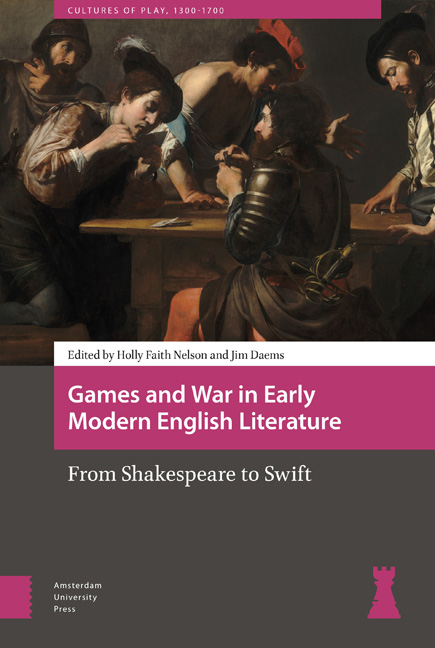Book contents
- Frontmatter
- Dedication
- Contents
- Acknowledgements
- The Interplay of Games and War in Early Modern English Literature: An Introduction
- 1 ‘Can this cock-pit hold the vasty fields of France?’ Cock-Fighting and the Representation of War in Shakespeare’s Henry V
- 2 Game Over: Play and War in Shakespeare’s Troilus and Cressida
- 3 Thomas Morton’s Maypole: Revels, War Games, and Transatlantic Conflict
- 4 Milton’s Epic Games: War and Recreation in Paradise Lost
- 5 Ciphers and Gaming for Pleasure and War
- 6 Virtual Reality, Role Play, and World-Building in Margaret Cavendish’s Literary War Games
- 7 Dice, Jesting, and the ‘Pleasing Delusion’ of Warlike Love in Aphra Behn’s The Luckey Chance
- 8 War and Games in Swift’s Battle of the Books and Gulliver’s Travels
- 9 Time-Servers, Turncoats, and the Hostile Reprint: Considering the Conflict of a Paper War
- Index
1 - ‘Can this cock-pit hold the vasty fields of France?’ Cock-Fighting and the Representation of War in Shakespeare’s Henry V
Published online by Cambridge University Press: 21 November 2020
- Frontmatter
- Dedication
- Contents
- Acknowledgements
- The Interplay of Games and War in Early Modern English Literature: An Introduction
- 1 ‘Can this cock-pit hold the vasty fields of France?’ Cock-Fighting and the Representation of War in Shakespeare’s Henry V
- 2 Game Over: Play and War in Shakespeare’s Troilus and Cressida
- 3 Thomas Morton’s Maypole: Revels, War Games, and Transatlantic Conflict
- 4 Milton’s Epic Games: War and Recreation in Paradise Lost
- 5 Ciphers and Gaming for Pleasure and War
- 6 Virtual Reality, Role Play, and World-Building in Margaret Cavendish’s Literary War Games
- 7 Dice, Jesting, and the ‘Pleasing Delusion’ of Warlike Love in Aphra Behn’s The Luckey Chance
- 8 War and Games in Swift’s Battle of the Books and Gulliver’s Travels
- 9 Time-Servers, Turncoats, and the Hostile Reprint: Considering the Conflict of a Paper War
- Index
Summary
Abstract
This chapter argues that the Chorus's allusion to cock-fighting in the Prologue of William Shakespeare's Henry V establishes both an epic and an intensely nationalist tone. It immediately prompts the audience to anticipate a bloody fight to the death that transcends the physical limits of simulation upon the stage. The cock-fighting allusion is particularly apt for these purposes because of contemporary views of the ‘sport’ as both a heroic conflict between its adversaries and as a communal activity that cuts across socio-economic lines in the Elizabethan period.
Keywords: animal symbolism in Shakespeare; Elizabethan pastimes; idealization of war in Shakespeare; Shakespeare and early modern popular culture
As Gregory M. Colón Semenza has underlined, when Shakespeare employs sports metaphors to describe battles and conflicts in his works, particularly in his history plays, they often serve to expose, if implicitly, the futility of war. Although this is especially striking in the plays from the first tetralogy, the cock-fighting metaphor in the Prologue of Henry V strikes a very different chord. The at first self-deprecatory and apologetic trope of the theatrical stage as a ‘cockpit’, whose dimensions cannot possibly represent the bloody battles of the Hundred Years’ War truthfully, is extended in the same passage when both countries are implicitly likened to two fighting animals:
Suppose within the girdle of these walls
Are now confined two mighty monarchies,
Whose high uprearèd and abutting fronts
The perilous narrow ocean parts asunder.
As we shall see, this extended metaphor resonates deeply with the practice and symbolism of cock-fighting in sixteenth- and seventeenth-century England. It is also crucial in shaping the audience's dramatic experience. According to Gina Bloom, games on the early modern stage
invited playgoers to work by way of phenomenological analogy through their experience of spectatorship in the theatre, reminding them that the theatre, like a game, is an interactive medium that demands cognitive, emotional, and embodied engagement from its participants.
Over the course of this chapter, I will argue that conjuring up the image of cockfighting at the beginning of the play is, in fact, a way to shore up the epic tone of the Chorus's Prologue and fuel a nationalist sentiment amongst the audience.
- Type
- Chapter
- Information
- Games and War in Early Modern English LiteratureFrom Shakespeare to Swift, pp. 23 - 38Publisher: Amsterdam University PressPrint publication year: 2019

